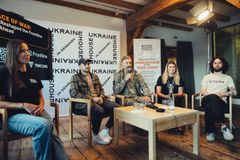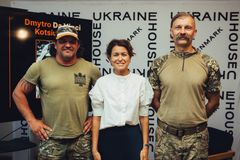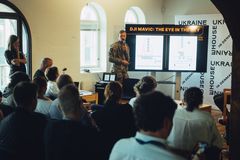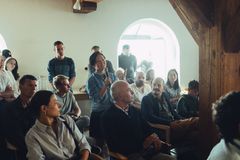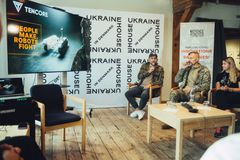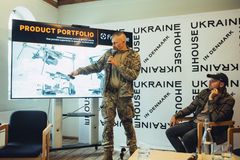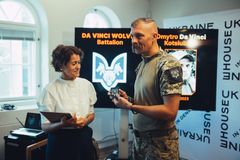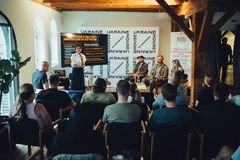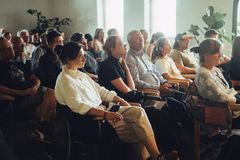How Ukraine’s Da Vinci Wolves Are Rewriting the Rules of War: Military Tech Discussion at Ukraine House in Denmark
Copenhagen, Denmark — August 22, 2025. At Ukraine House in Denmark, soldiers, engineers, and policymakers gathered to share the lessons of a war where milltech drones and robots, and artificial intelligence have moved from theory to daily reality in Ukraine. Organized by the Defence Robotics, a charity foundation, the discussion brought together Oleksandr Yabchanka, Head of the Robotic Systems Service of the Da Vinci Wolves battalion, alongside innovators from companies Frontline and Tencore, two of Ukraine’s leading developers of ground robotic platforms.
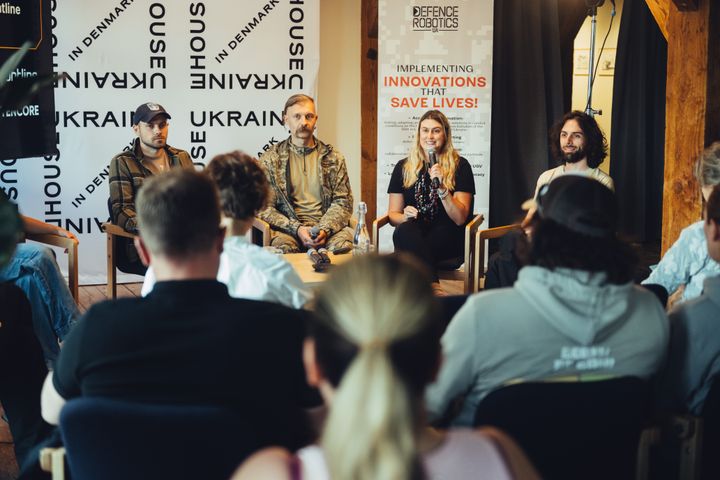
Remembering Dmytro Kotsiubailo “Da Vinci”
The discussion opened with a reflection on Hero of Ukraine Dmytro Kotsiubailo, call sign Da Vinci, the battalion’s first commander. His story is deeply intertwined with the history of Ukraine’s modern struggle for sovereignty. Many of the battalion’s founding members were teenagers during the Revolution of Dignity in 2014, among the first volunteers to defend Ukraine when Russia first launched aggression:
“[He] was one of the first to go to Donbas to confront the evil that had descended upon our country. It is no exaggeration to say that it was thanks to people [like Dmytro] that Ukraine survived.”
Dmytro was described as embodying selfless leadership, someone who personally confronted danger while ensuring the safety of his comrades. His death near Bakhmut in early 2023, caused by a cluster munition after he had secured the safety of his team, was emblematic of the enormous sacrifices Ukraine’s defenders have made.
The audience was reminded that his life—and death—exemplified the human cost of war, and framed the evening’s focus on the critical role of technology. For the Da Vinci Wolves, robotics and unmanned systems are not abstract innovations; they are tools designed to preserve life, prevent needless loss, and allow soldiers to operate with greater safety under extreme conditions. Dmytro’s legacy underscored that behind every technological advancement lies a fundamental human imperative: to save lives and maintain the resilience of Ukraine’s defense forces.
The Drone Revolution
For decades, mechanized combat followed predictable patterns, with infantry, artillery, and armored units clashing along fixed front lines. This predictability ended with the arrival of small, commercially available drones, such as the DJI Mavic series, often called “wedding drones” by soldiers. These relatively inexpensive platforms allowed Ukrainian forces to observe enemy movements, identify armored units, and coordinate precision strikes long before the enemy could reach their positions:
“Now we see enemy armor 10 kilometers away, long before it reaches our lines,” explained one commander. “Artillery destroys them before they can even fire. This changed everything.”
Data presented at the event revealed staggering Russian losses, with peaks of up to 1,500 troops per day in late 2024, largely due to drone-guided artillery strikes. Yet Oleksandr Yabchanka emphasized that these advantages have been inherently temporary: as the battlefield evolved, the enemy adapted. Every technological leap requires rapid iteration and adaptation, meaning that superiority is never static. “Technology on the front line changes very quickly, literally every six months,” he noted, highlighting that innovation must be continuous, or the cost in lives and equipment becomes severe. The audience came away with a clear understanding that the promise of drones and robotic systems lies not in permanent dominance but in creating windows of advantage that must be leveraged intelligently and swiftly.
Robotics on the Battlefield
The discussion then moved to the role of unmanned ground vehicles (UGVs) in Ukraine’s defense strategy. These systems now perform a wide range of critical functions: delivering ammunition, evacuating the wounded, retrieving damaged drones, and even performing recovery operations under fire. Yabchanka stressed that in today’s war, exposure for even a few seconds can be fatal, making robotics an essential component for preserving human life. For example, he showed a video of how UGV retrieved the body of a fallen soldier, sparing comrades from exposure to enemy fire.
Roman Tkachenko, Co-founder and CBDO at Ukrainian military technology company Tencore, described how his company, founded in 2023, already employs over 200 people who are providing drones to the battlefield. Yet he admitted the scale of the challenge is enormous.
This robotic presence in warfare has become a future where robots fight other robots. And in Ukraine, it is now happening. He warned that the scale of this transformation depends heavily on resources and international support, and today the Ukrainian military still lacks support. His message was clear: Ukraine’s defenders believe in this technology, but scaling it requires urgent investment:
“Believe in Ukraine as we are believing, believe in our defenders as we are believing, and believe in the Ukrainian business we are working with. Together we could defend not only Ukraine, because this war is not only about Ukraine. It’s beyond us. You can help, you can join, and we could do history together.”
Oleksii Markhovskii, Co-founder and CPO of Frontline, highlighted that at his company, the goal is to integrate multiple systems so they work seamlessly together. Speed and precision are essential: seconds—and even milliseconds—can decide life or death. That’s why their technology eliminates delays and human error, allowing coordinates and decisions to be transmitted almost instantly.
He described the rapid evolution of both air and ground robotic systems. Ukrainian forces first faced a massive demand for drones, especially as Russia adapted with powerful electronic warfare. This forced Ukrainian engineers to redesign connectivity from scratch so their drones and ground robots could survive in a contested environment. Now, they can remotely control systems deep behind enemy lines—sometimes from 40 kilometers away—launching grenades and correcting fire automatically with the help of robotics and ballistic calculators.
Finally, Oleksiy emphasized that Europe should learn from Ukraine’s experience: “Old arsenals alone are not enough—victory requires affordable, mobile, and unmanned systems at scale. When used together, they can resist even massive waves of Russian attacks, shifting the balance in modern warfare.”
Lessons for Europe and the Future
Oleksandr Yabchanka also addressed the broader implications of Ukraine’s experience for Europe and the wider world: “Artificial intelligence, unmanned systems, and rapid technological adaptation are no longer optional; they are essential. Europe must accelerate its development of mobile, scalable, and affordable unmanned systems to prevent the lessons learned in Ukraine from being exploited by authoritarian states.”
Yabchanka highlighted two pervasive misconceptions in public and policy discussions: first, that the slow daily advance of Russian forces can be mitigated simply by the terrain itself; in reality, it is the defenders and their ability to utilize human and technological resources that determine the effective progress of an aggressor. Second, the belief that if Ukraine can hold back Russia for years using mostly outdated NATO weapons, then Russia would never dare attack NATO with its far newer equipment. This is false because military strength depends on the use of the new generation of technology and the ability to use it effectively, not on how new the weapons look. The war has shifted into the era of drones and unmanned systems, where both Ukraine and Russia are gaining experience faster than many NATO countries.
Ukraine’s defense industry has grown 14-fold since 2022, producing millions of drones annually, but Russia remains a formidable competitor, rapidly incorporating innovations into its military doctrine. Yabchanka urged Europe to recognize that investing in defense-industrial capacity is not a matter of ambition but survival, as authoritarian states are learning lessons quickly and applying them in ways democracies often lag. Ukraine, having transitioned from infantry-based operations to technology-driven defense out of necessity, is prepared to share its battlefield experience and technological solutions with European partners before it is too late.
The evening concluded with a powerful message: the future of warfare is being written in Ukraine, and the world must pay attention.
Ukraine House in Denmark expresses its gratitude to all participants for sharing expertise and frontline experience. The event demonstrates how courage, innovation, and technological urgency are not only shaping Ukraine’s defense but also redefining modern security for Europe and the world.
Nøgleord
Billeder
Følg pressemeddelelser fra Ukraine House in Denmark
Skriv dig op her, og modtag pressemeddelelser på e-mail. Indtast din e-mail, klik på abonner, og følg instruktionerne i den udsendte e-mail.
Flere pressemeddelelser fra Ukraine House in Denmark
Ukraine House i Danmark afholder debat om afslutningen på russisk kolonialisme21.10.2025 14:55:47 CEST | Pressemeddelelse
København, 22. september 2025 – Ukraine House i Danmark afholdt i samarbejde med Udenrigspolitisk Selskab og Free Nations of Post-Russia Forum en paneldebat om afslutningen på russisk kolonialisme. Arrangementet samlede internationale eksperter, beslutningstagere og ledelsesrepræsentanter for civilsamfundet til en drøftelse af Ruslands imperiale tilbagegang og nødvendigheden af at forberede sig på dens konsekvenser. Debatten blev modereret af Nataliia Popovych, formand for Ukraine House i Danmark, og panelet bestod af Charlotte Flindt Pedersen (Udenrigspolitisk Selskab), Jacob Kaarsbo (analytiker i efterretnings- og sikkerhedspolitik), Juraj Mesík (Slovakisk Udenrigspolitisk Selskab), Yaroslav Yurchyshyn (medlem af det ukrainske parlament), Oleg Magaletskyi (Free Nations of Post-Russia Forum) og Mette Skak (forsker i russisk udenrigs- og sikkerhedspolitik).
Post-Release: Myroslav Marynovych om mod, samvittighed og konfrontationen med nutidens Rusland6.10.2025 10:45:03 CEST | Pressemeddelelse
København, Danmark – Den 5. september havde Ukraine House i Danmark den ære at være vært forMyroslav Marynovych, en vigtig dissident, medstifter af den Ukrainske Helsingforsgruppe, Gulag-overlever og prorektor ved det Ukrainske Katolske Universitet. Arrangementet kastede lys over modet hos Ukraines menneskerettighedsforkæmpere i 1960’erne og 70’erne – en generation, der modsatte sig den sovjetiske totalitære maskine, på et tidspunkt hvor næsten ingen troede, det var muligt.
Ukraine House in Denmark Hosts Debate on the End of Russian Colonialism1.10.2025 08:00:00 CEST | Pressemeddelelse
Copenhagen, September 22, 2025 — Ukraine House in Denmark, together with the Danish Foreign Policy Society and the Free Nations of Post-Russia Forum, convened a high-level discussion on the end of Russian colonialism. The event brought together international experts, policymakers, and civil society leaders to examine Russia’s imperial decline and the urgent need to prepare for its consequences. Moderated by Nataliia Popovych, Chairperson of Ukraine House in Denmark, the panel featured Charlotte Flindt Pedersen (Danish Foreign Policy Society), Jacob Kaarsbo (Intelligence and Security Analyst), Juraj Mesík (Slovak Foreign Policy Association), Yaroslav Yurchyshyn (Member of the Ukrainian Parliament), Oleg Magaletskyi (Free Nations of Post-Russia Forum), and Mette Skak (Scholar on Russian foreign and security policy).
Post-Release: Myroslav Marynovych on Courage, Conscience, and Confronting Today’s Russia30.9.2025 14:09:02 CEST | Pressemeddelelse
Copenhagen, Denmark – On 5 September, Ukraine House in Denmark was honored to host Myroslav Marynovych, a keystone dissident, co-founder of the Ukrainian Helsinki Group, Gulag survivor, and Vice-Rector of the Ukrainian Catholic University. The event shone a light on the courage of Ukraine’s human rights defenders in the 1960s and 70s, a generation that resisted the Soviet totalitarian machine when almost no one believed it was possible.
Ukraine House in Denmark Opens “Uncurtained: Ukrainian Art in Danish Collections 1989–2023”1.9.2025 08:00:00 CEST | Nyhed
Copenhagen, August 21, 2025 – Ukraine House in Denmark proudly opened “Uncurtained: Ukrainian Art in Danish Collections 1989–2023”, its 11th major exhibition and a landmark research project tracing 35 years of cultural exchange between Denmark and Ukraine. Curated by Kateryna Stukalova, the exhibition brings together over 100 works by 28 Ukrainian artists. In her opening remarks Nataliia Popovych, chairperson of Ukraine House in Denmark, emphasized: “Uncurtained is not just an exhibition — it is a journey through thirty-five years of trust, of Ukrainian art being seen, collected, and preserved in Denmark. Long before the world spoke of the ‘Danish model’ of support for Ukraine, Danish curators, collectors, and institutions chose to trust in Ukrainian creativity — to see our culture as sovereign and distinct. Opening on the eve of Ukraine’s Independence Day, this exhibition stands as a tribute not only to our artists, but to the very idea of independence — a daily choice to defend cultu
I vores nyhedsrum kan du læse alle vores pressemeddelelser, tilgå materiale i form af billeder og dokumenter samt finde vores kontaktoplysninger.
Besøg vores nyhedsrum
